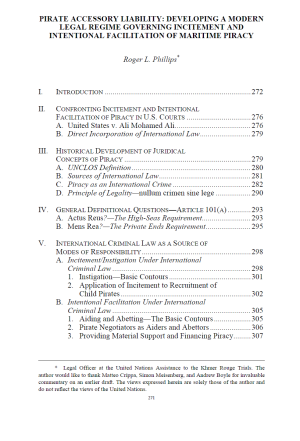April 23, 2013
by Roger L. Phillips

Justice Kennedy – the deciding vote in Kiobel
Cross-posted at opiniojuris.org
The majority opinion in Kiobel precludes Alien Tort Statute claims for foreign conduct against foreign victims, leaving a small door for potential future claims that involve extraterritorial conduct so long as they touch and concern US territorial interests. But, when does a claim “touch and concern” the territory of the United States? Roger Alford notes that piracy may present an incident of “cross-border” conduct that could clarify this issue. Indeed, two piracy cases will imminently arrive at SCOTUS’ courthouse steps.
The piracy statute 18 USC 1651 shares much in common with the Alien Tort Statute: both were passed in the same time frame and both have reference to “the law of nations.” The presumption against extraterritoriality applies to 18 USC 1651. However, the plain language of the piracy statute and its historical context clearly rebut the presumption for all conduct that occurs on the high seas. Further, neither the victim nor the defendant need be American (U.S. v. Klintock). That said, there remains an important subset of piracy cases that involve conduct both on the high seas and within the territory of another sovereign: acts of aiding and abetting piracy through financing or negotiating ransoms for acts of piracy; or recruiting of child pirates.
In US v. Shibin (4th Circuit) and US v. Ali (DC Circuit), currently on appeal, the underlying criminal conduct of hijacking vessels occurred on the high seas. But, the negotiators in these cases only boarded the vessels upon entry into Somali territorial waters. Hence the mixed loci delecti on the high seas and within the territory of another state. Does this type of mixed conduct touch and concern the territory of the United States?
First, the plain language of the piracy statute would not rebut the presumption against extraterritoriality for conduct occurring within the territory of another state (the statute merely applies to conduct on the “high seas”). However, the historical context of the piracy statute indicates that it was intended to prevent impunity for acts of piracy wherever committed. That is why the modern definition of piracy applies to conduct outside the jurisdiction of any state, as well as to the high seas.
Here is where a case-by-case analysis, suggested in Part IV of the Kiobel majority, could be determinative. In Shibin, the defendant is accused of negotiating the ransom of two vessels. The first vessel has a strong nexus to US interests; the victims were American nationals and the targeted vessel was flagged in the US. Although a vessel’s flag does not designate its surface as territory of the sovereign, it is treated in much the same fashion (Lauritzen v. Larsen) which is to say that there are strong domestic interests in exercising jurisdiction over acts of piracy on one’s flagged vessels. But the second course of conduct charged in Shibin involves a vessel with no links to the US apart from a general interest in suppressing acts of piracy. The same is true in Ali. As the district court described the case: “Defendant Ali Mohamed Ali, a Somali citizen, is accused of helping Somali pirates hijack a Bahamian ship, hold its Russian, Georgian, and Estonian crew hostage, and compel the ship’s Danish owners to pay a ransom for its release.” These latter facts would not prevent the exercise of jurisdiction if the alleged criminal conduct occurred on the high seas. The question is whether aiding and abetting conduct occurring within the territory of another state must touch and concern US interests. If answered in the affirmative, it would curtail the US’s ability to suppress and prosecute acts of piracy, which is contrary to the historical purpose and intent of 18 USC 1651. It would also be inefficient as those who initiate an act of piracy on the high seas and continue acts of piracy in foreign territorial waters could only be prosecuted for the former conduct.
One significant factor Kiobel instructs to consider is the imperative to avoid enmeshing US courts in foreign affairs. In this regard, the specific facts of the Somali cases militate in favour of exercising jurisdiction. For the then Transitional Federal Government (TFG) of Somalia did not have effective control over the territorial waters where these acts of piracy occurred. The UN Security Council authorized States and regional organizations “to undertake all necessary measures that are appropriate in Somalia, for the purpose of suppressing acts of piracy and armed robbery at sea,” including in its territorial sea. The UNSC took great pains to note the TFG retained full sovereignty, that these exceptional measures did not create customary international law, and that they were authorized because the TFG had requested this assistance. It has been argued that the UNSC Resolutions authorized enforcement and stopped short of authorizing the prosecution of acts of piracy or armed robbery in Somalia’s territorial waters. Notwithstanding these provisos, the interest in preventing “unintended clashes between our laws and those of other nations which could result in international discord” (Morrison) that lies at the heart of the presumption against extraterritoriality, is greatly diminished in these piracy cases.
Justice Kennedy notes in his concurrence in Kiobel that in disputes not involving solely extraterritorial conduct, “the proper implementation of the presumption against extraterritorial application may require some further elaboration and explanation.” Although the majority appears to exceptionalize piracy (“pirates may well be a category unto themselves”), such a reading is inconsistent with Sosa v. Alvarez-Machain which explicitly asked “who are today’s pirates?” The terms “pirate” or “piracy” appear in the various opinions in Kiobel 50 times. Perhaps it is time to address piracy directly, and not merely by analogy. Such could elucidate the “touch and concern” requirement applicable in ATS cases.
